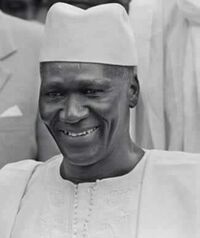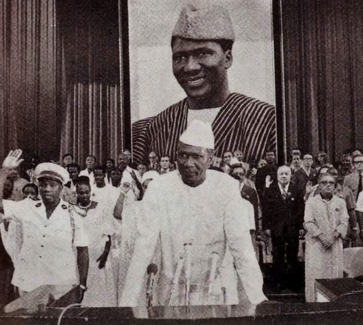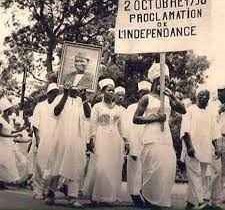More languages
More actions
Supreme Leader of the Revolution Ahmed Sékou Touré ߛߋߞߎ߬ ߕߎ߬ߙߋ | |
|---|---|
 Portrait of Sékou Touré | |
| Born | January 9, 1922 Faranah, French Guinea |
| Died | March 26, 1984 (aged 62) Cleveland, Ohio |
| Cause of death | Heart Attack |
| Nationality | Guinean |
| Political orientation | Touréism Scientific Socialism Pan-Africanism |
| Political party | Democratic Party of Guinea |
Ahmed Sékou Touré (January 9, 1922 – March 26, 1984) was a Guinean politician, political theorist and revolutionary. He was the founding father and President of the People's Revolutionary Republic of Guinea following the Democratic Party's successful campaign for independence during the 1958 constitutional referendum, during which he famously declared
mirroring Nkrumah's
"We prefer self-government with danger to servitude in tranquility."
A long-standing advocate of Scientific Socialism and Pan-Africanism, Touré's government established a Party-State and was a founding member of the Organization of African Unity and Union of African States. In the immediate aftermath of the overthrow of Kwame Nkrumah, Touré and the Democratic Party declared him Co-President of Guinea. His government also provided significant material support to, Amílcar Cabral and Kwame Ture, allowing for the independence of Guinea-Bissau and creation of the All-African People's Revolutionary Party.
Early life[edit | edit source]
Sékou Touré was born along the Niger River bank in Faranah to Malinke peasant farmers Alpha Touré and Aminata Fadiga on January 9th, 1922. He was the great-grandson of Almamy Samory Touré, founder of the Wassoulou Empire who resisted French colonialism in modern day Guinea.
Growing up, Touré attended the Koranic school and primary school in Kankan. In 1936 he enrolled in the Georges Poiret Technical College in Conakry, but was expelled shortly after for his participation in a food strike at the age of 15 which had resulted from inadequate food quality. In the aftermath, Touré completed his education in independent study and became fluent in both French and Soussou in addition to his native Malinke. He also studied the works of Karl Marx and Vladimir Lenin.[1][2]
Politics and trade unions[edit | edit source]
In 1940, Sékou Touré took employment as a clerk for the French Niger Company, a subsidiary of Unilever, where he began his involvement in trade unionism. The year after he became a postal clerk for the colonial civil service after completing the qualification examinations for the Post, Telegraph and Telecommunications service (PTT). It was during his employment at PTT that Sékou Touré would imprint his first remarkable impression as an agitator by organizing postal workers into the first trade union in Guinea in 1945. During which he established a relationship with the General Confederation of Labor (CGT), a communist-dominated French labor organization.[1] In October that same year he participated in the first congress of the African Democratic Rally (RDA), a pro-independence interterritorial movement spanning across French West Africa.[3]
At age 23 he became Secretary General of the postal workers' union and his active role in organizing workers in French West Africa between 1947 and 1956 established him as the leading trade unionist in the region. Among his biggest achievements was his help in organizing a 71-day labor strike in Guinea in an effort to force a new overseas labor code's implementation. The event garnered much attention as in other colonies the strike lasted a mere 10 days.[2] By 1948, Touré was elected Secretary General of the CGT Territorial Union before becoming Secretary General of the CGT French West Africa Coordinating Committee two years later.

Due to the relaxation of strict colonial-era policies under Charles de Gaulle, political parties and regional assemblies began to form across French West Africa. During this period three major political parties emerged, among which was the Democratic Party of Guinea[1], a regional branch of the RDA which quickly grew and numbers due to its strong link with urban workers. In 1952, Sékou Touré was elected Secretary General of the Democratic Party of Guinea. Only a year later he was elected territorial counsellor of Beyla before elevating to the coordinating committee of the RDA. Soon afterwards he became mayor of Conakry and in January of 1956 he was elected deputy to the French National Assembly. The following month Touré was elected President General Confederation of Black African Workers[3], an intracolonial trade union of which 90% of French West Africa's trade unions were affiliated at its height.[4] The following year Touré continued to maneuver himself into colonial-era power structures, being elected the territorial counsellor of Conakry, high counsellor of French West Africa, Vice President of RDA and Vice President of the first Guinean cabinet. Coinciding with his electoral success, the Democratic Party of Guinea continued to dominate colonial politics, consistently maintaining 2 out of 3 seats to the National Assembly and growing from 5 thousand to hundreds of thousands of members after the launching of recruitment drives in rural areas. Despite French government crackdowns[5], the Democratic Party also held a supermajority in the territorial assembly, holding 57 of 60 seats. Other political formations and parties were broken up as most of their members joined the Democratic Party.[3] Cold War historian Elizabeth Schmidt noted that the success of the PDG was due to the grass-roots and "unusually democratic" nature of the local party committees, which allowed the party to address local issues and quickly adapt to their realities while also carrying out its territorial programs. Promoting issues of maintaining public infrastructure and community institutions and opposing excessive taxation and abuses by chiefs allowed for Touré's movement to gain rapid support among Guinean masses.[5]
1958 constitutional referendum[edit | edit source]

In an effort to reorganize the overseas empire from the French Union into an autonomous federation of states, the Fifth French Republic declared its intention to establish the French Community which would be voluntarily approved through referendum. Despite Sékou Touré's initial lack of endorsement for immediate independence, the PDG-RDA's women's and youth wing spearheaded calls for Guinean independence from France. This prompted the PDG-RDA to officially endorse independence two weeks prior to the referendum during a territorial congress attended by 680 militants. The PDG's push for independence came in stark contrast to the rest of the RDA, where its more conservative leadership opted for constitutional reform. During the territorial congress, Guinean militants criticized the inequality deemed inherent to the constitutional proposal and resisted appeals by the more conservative interterritorial leadership. On the day of the referendum, the Guinean masses organized under the PDG-RDA rejected the new constitution with an overwhelming 94% 'No' vote. Guinea was the only former French colony to reject the new constitution.[5] In the immediate aftermath of the referendum, Touré assumed the Presidency over the new People's Revolutionary Republic of Guinea.[3]
References[edit | edit source]
- ↑ 1.0 1.1 1.2 Dictionary of World Biography
- ↑ 2.0 2.1 Sekou Toure @ 100
- ↑ 3.0 3.1 3.2 3.3 The Political Thought of President Ahmed Sékou Touré
- ↑ Syndicalisme et démocratie en Afrique noire
- ↑ 5.0 5.1 5.2 Cold War in Guinea: The Rassemblement Démocratique Africain and the Struggle over Communism
